Archived Storm Damage Blog Posts
Preparing for a Hurricane to Limit Home Damage and Keep Your Family Safe
9/5/2023 (Permalink)
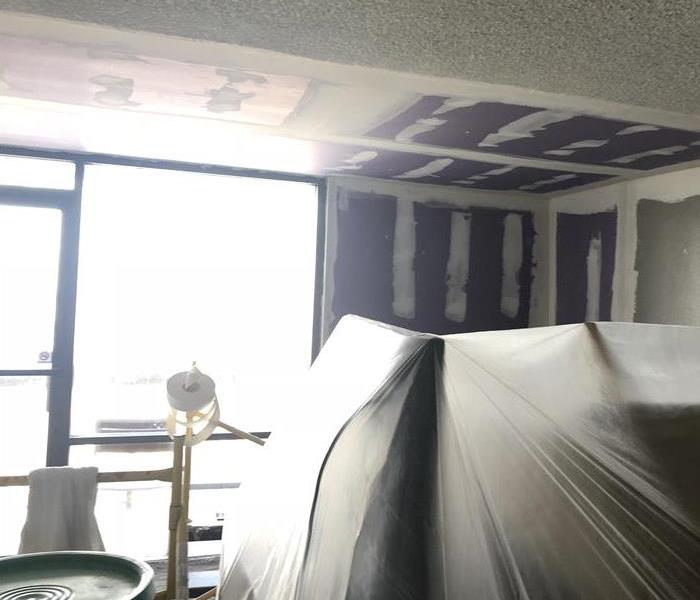 SERVPRO of Jacksonville Beach/Ponte Vedra offers tips for hurricane preparedness to limit hurricane damage to your home.
SERVPRO of Jacksonville Beach/Ponte Vedra offers tips for hurricane preparedness to limit hurricane damage to your home.
As hurricane season approaches, it's crucial to assess your readiness. Safeguarding your home and ensuring your family's safety are paramount. In this discussion, we will explore the significance of hurricane preparedness and provide valuable tips to help you brace for the impact of a formidable storm.
- Make some plans. You’ll need an evacuation plan, listing different evacuation destinations and an emergency pack list, as well as phone numbers for emergency contacts. Make sure your family is familiar with the plan and perform evacuation drills if you feel it’s necessary. You’ll also need a hurricane preparedness list of the supplies you’ll need to have on hand during a storm. This list should include seven days’ worth of non-perishable food and bottled water, tools, flashlights, a radio, and extra batteries, clothes, bedding, plasticware, a waterproof container with important documents, games and comfort items, and first aid supplies, including prescription medication and personal hygiene items.
- Take stock of your possessions. Do a complete inventory of your home before a hurricane hits, so you’ll be ready if you need to file an insurance claim or apply for disaster aid. It’s important to review your insurance policy, also, so that you can make any necessary adjustments to ensure that you’re covered if a hurricane hits.
- Secure your home’s exterior before a storm. Hurricanes come with high winds that can send just about anything flying through your windows and doors. Secure your windows, sliding glass doors, and entry doors with plywood or hurricane shutters to prevent breakage and interior damage. Keep wind and water out of the house by sealing exterior vents with marine-grade plywood, installing covers on outdoor electrical outlets, putting bibs on garden spigots, and caulking around cables and pipes that penetrate the exterior wall of the house. Consider installing roof straps and reinforcing your garage door as well. Make a thorough inspection to determine if there’s anything that could become airborne, including furniture, planters, bikes, toys, and other outdoor items. Move these to a secure location and trim trees and branches so they won’t break off during a storm. If you have a pool, cover it and secure the cover, and if you have a shed, make sure the door is closed and secure. Check your foundation and repair cracks, cover your outside HVAC components, and if you have a sump pump, test it to make sure it’s working properly.
- Get the interior ready as well. Carefully check wall hangings to confirm that they’re secure and take any outdoor art inside. Turn your refrigerator to the coldest setting to prevent spoilage in case of a power outage and remove fuses from your air conditioner to protect it from damage. If you need to evacuate, unplug all of your major appliances, and move small electronics like televisions, vacuums, and stereos to a higher floor. Turn off the main water valve to the home, cut off the electricity at the circuit breaker, and turn off the gas at each appliance.
- Care for your cars. Fill the gas tanks and move your cars to higher ground or into your garage and away from trees and power lines.
For hurricane or tropical storm damage to your home in Northeast Florida, rely on the expertise of SERVPRO of Mandarin. Our skilled restoration technicians possess the necessary training and cutting-edge equipment to bring your Jacksonville home back to its pre-storm state. With over 40 years of trusted leadership in the water restoration industry, we are dedicated to serving our community. Reach out to us at (904) 636-0044 or visit our website to contact us for assistance.
Tropical Storm Clean-up and Restoration
7/25/2023 (Permalink)
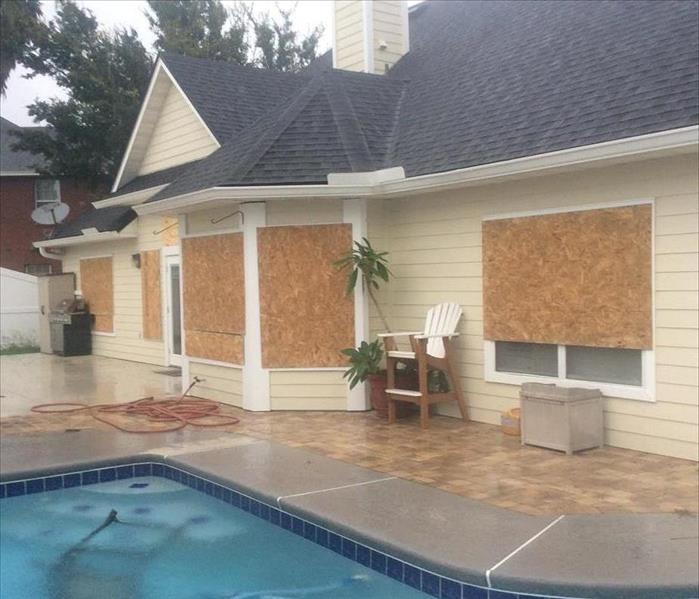 SERVPRO of Mandarin offers tips for storm clean-up and restoration.
SERVPRO of Mandarin offers tips for storm clean-up and restoration.
Water damage can occur in your home or business due to various reasons such as a broken pipe or a leaky roof. However, if you've experienced water damage from a tropical storm, the recovery and restoration process can be more complex than dealing with a simple leaking faucet. Numerous factors, such as flooding, high winds, and flying debris, can exacerbate the damage caused by a tropical storm, making restoration more complicated and time-consuming.
A tropical storm or hurricane can cause damage from wind, rising water, falling trees, and flying debris. Recovery from any or all of these can be difficult, but there are some tips for you to follow after the storm has passed.
- If you’ve left the home to seek safer shelter, you need to be careful when returning home. First, make sure the local authorities have announced that it’s safe to return.
- You may have lost power or other utilities, so bring necessities like food and water with you.
- Have a professional check for damage to your home, to make sure it’s safe. If necessary, you may have to board up damaged windows or doors until repairs can be made.
- Avoid roads that are covered with water while you’re coming home and stay away from any downed power lines you may encounter.
- If you’re going to use a generator, make sure it’s in an area with plenty of ventilation, and never inside a garage.
- In case of possible gas leaks, you should use flashlights instead of candles.
- Check the food in your fridge for spoilage, and discard anything you’re not absolutely sure about
- Keep children and pets inside until things are back to normal.
- Contact your insurance company as soon as possible to start the claims process. You may find mobile emergency claims centers set up in mall or grocery store parking lots.
Hurricanes and tropical storms pack powerful wind and heavy rain that can cause significant damage to your property. After the storm has passed, you need help to clean up and repair your property so you can return back to normal as quickly as possible. At SERVPRO of Mandarin, we understand that dealing with a disaster can be overwhelming, and our goal is to help make the restoration process as smooth and stress free as possible by providing a prompt response. In addition, we will work directly with your insurance company.
As a locally owned and operated small business, we take pride in responding quickly to any size disaster. Our team of highly trained technicians is dedicated to providing 24-hour emergency service to the Mandarin area, and we have the necessary training and expertise to handle all your restoration and cleaning needs. We're proud to be an IICRC (Institute of Inspection Cleaning and Restoration Certified) Firm, and we go above and beyond by ensuring that all our technicians, office staff, and business development teams are individually trained and IICRC certified as well. With our commitment to quality and expertise, you can trust us to restore your property to its pre-damage condition.
For additional information about our company, visit our website or call us at 904-636-0044.
What To Do With Damage That's Not Covered By Insurance
5/23/2023 (Permalink)
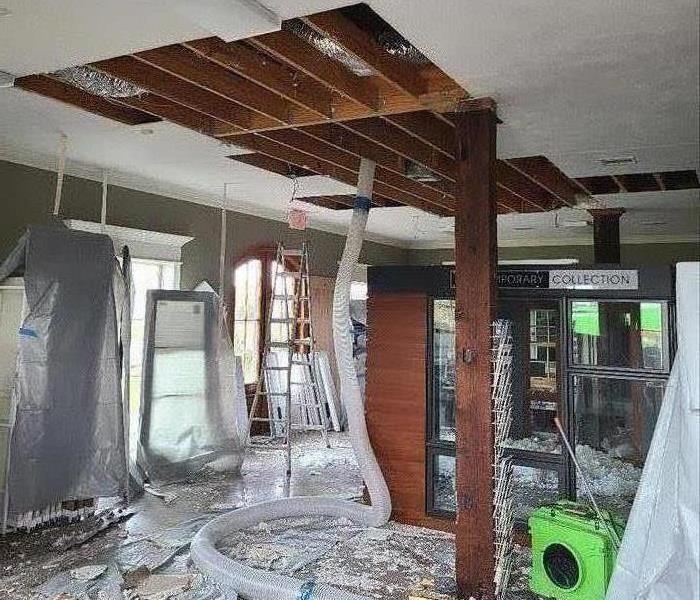 Storm damage done to your home can be very stressful. Let SERVPRO handle the stress of repair and remediation for you.
Storm damage done to your home can be very stressful. Let SERVPRO handle the stress of repair and remediation for you.
Damage That's Not Covered By Insurance
We Provide Help With Damage Not Covered By Insurance in Jacksonville, FL. If you've suffered storm damage, fire damage, mold, or water damage that isn’t covered by your insurance policy, here are some steps you can take to recover.
SERVPRO of Mandarin Can Help
Damage to your home can be a stressful experience, particularly if it's not covered by insurance. While you may feel tempted to try and fix the damage yourself, it's important to remember that some repairs can be dangerous and should only be attempted by a professional. In this blog post, we'll go over what you can do if damage to your home is not covered by insurance.
FEMA Disaster Grants
FEMA offers grants to help homeowners and renters recover from disasters. These grants are not loans and do not need to be repaid. FEMA disaster grants can help pay for temporary housing, home repairs, uninsured and underinsured personal property losses, and other serious disaster-related expenses.
Partner With a Reputable Restoration Company
Homeowners insurance is vital in protecting your wallet should disaster strike your home. However, some damages may not be covered by your policy. Water damage is a common issue that homeowners face that is often not fully covered by insurance. If you experience water damage in your home, it's important to partner with a reputable restoration company that can help you navigate the process, even if your insurance doesn't cover everything.
What Does Homeowners Insurance Cover?
Homeowners insurance is a type of property insurance that covers a private residence. The policy provides financial protection against loss from events such as fire, theft, or weather damage. It also covers liability for injuries that occur on the property.
Most homeowner's policies include four types of coverage: dwelling coverage, personal property coverage, liability coverage, and medical payments coverage.
- Dwelling coverage protects the structure of the home.
- Personal property coverage protects the belongings inside the home.
- Liability coverage protects the policyholder from lawsuits resulting from injuries or damage that they or their family members have caused.
- Medical payments coverage pays for medical expenses related to injuries that occur on the property.
It’s important to know that homeowners' insurance policies can be customized to fit the needs of the policyholder, and additional coverage can be purchased for extra protection.
Contact SERVPRO to Schedule a Consultation
SERVPRO of Mandarin is here for our customers and community. We want to provide the best service possible and hope that doing so will help our community. If you need our services for repair or remediation, please do not hesitate to contact us for more information or to schedule a consultation. Our team would be happy to assist you.
Steps to Take After Storm Damage
1/14/2022 (Permalink)
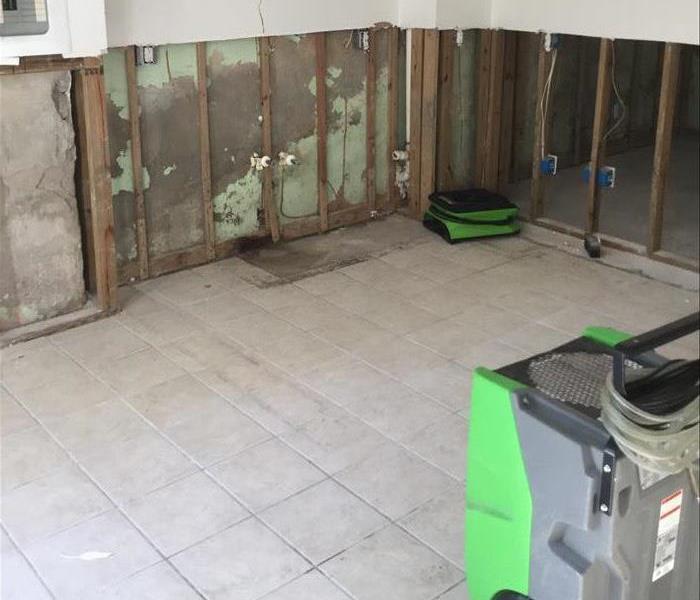 Make sure to call SERVPRO of Mandarin if your northeast Florida business has suffered storm damage.
Make sure to call SERVPRO of Mandarin if your northeast Florida business has suffered storm damage.
Steps to Take After Storm Damage
Dealing with a major storm can be devastating. If you have personally experienced one or choose to ride it out, you may be wondering what to do next. Here are a few suggestions.
Safety First
Is everyone safe? If anyone needs medical attention, call 911. If not, carefully and slowly assess the home and grounds for broken glass, splintered wood, exposed nails, or anything else that can cause injuries. Be very careful moving anything, wearing work gloves if possible. Shut off all gas valves if you smell gas. If you see a power line down, stay far from it and report it to the police or your power company.
Record the Damage
Take photographs of the damage. This serves two purposes. First, it helps you show your insurance company and restoration company the extent of the damage. Second, it helps you contemplate the damage after you leave the building.
Here are a few things you may want to focus your photography on:
- Damaged windows and doors
- Roof damage - tree limbs and other debris, standing water, damage to tiles or shingles, gutters and downspouts
- Damage to HVAC components such as exterior heat pumps
- Basement flooding
- Water intrusion in the attic/ wet insulation
- Damage to exterior siding
- Burn marks that may have been caused by water infiltrating electrical outlets or cords, or by downed power lines
- Damage to computers, printers, televisions, speakers or other electronic equipment
Call Your Insurance Company
As soon as you can, call your insurance company or agent and tell them all you can about the damage. Tell them you have photos that you can send them. They will eventually send out an adjuster to assess the damages. Read your policy and ask questions about what is covered and the timeframe of your compensation. Remember that storm damage is covered by most residential and commercial insurance policies but flood insurance is a separate policy. They can also give you contact information for trusted contractors and help you avoid unscrupulous ones. Your insurance company can tell you if any aspect of your damage is covered by federal emergency aid programs as well. Keep any receipts related to the storm damage so that you can seek reimbursement.
Avoid Further Damages
To avoid storm damage getting worse, remove vulnerable items (especially electronics, wood furniture, etc.) from standing water and put them somewhere they’re more likely to dry out quickly. Hang up rugs. Carpets with extensive water damage will probably need to be replaced. As soon as you can, call a water clean-up and restoration company. They have special equipment, experience and methods to stop further damage and begin the restoration process immediately.
Make sure to call SERVPRO of Mandarin if your northeast Florida home or business has suffered storm damage. Our highly-trained restoration technicians have the experience and equipment to restore your North Florida home and get everything back to like-new condition. A trusted leader in the industry, we’ve served our community for more than 40 years. Call (904) 638-2495.
Remodeling after Storm Damage
1/7/2022 (Permalink)
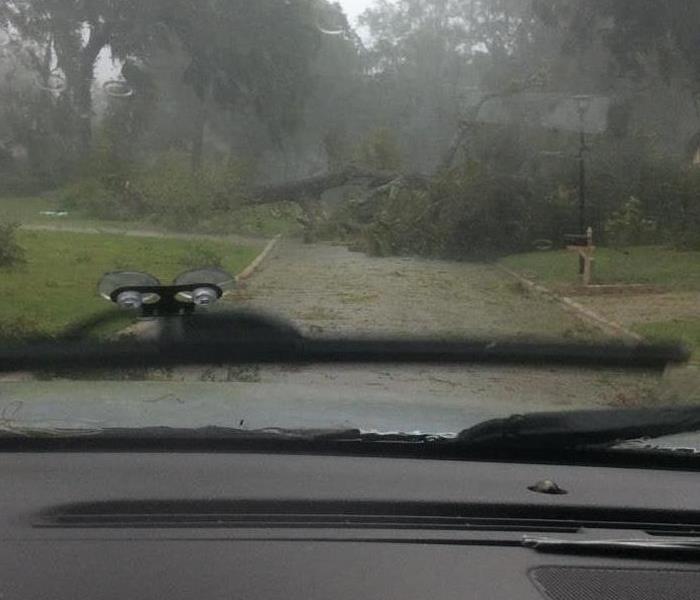 If you want to remodel after a storm, make sure your property is properly repaired and restored before you begin.
If you want to remodel after a storm, make sure your property is properly repaired and restored before you begin.
Remodeling after Storm Damage
If you have experienced storm damage to your home from a natural disaster, the process of getting your house back to its preloss condition can be overwhelming. If you happen to be an optimist, you might look at this as a great opportunity to renovate your space. While that can be a great idea, before you start ordering new fixtures, you will want to reach out to some storm damage repair companies to find one to help you make sure your home is safe and structurally sound. The faster you get a professional restoration team on the job, the less likely your home will sustain long-lasting effects from the storm. Here’s what you can expect from the process.
- If you’ve been away, prepare for a depressing sight. A natural disaster can wreak havoc on your home, so expect the damage to be dramatic. Just keep reminding yourself that once it’s done, it will be better than ever!
- Find out for sure what your insurance covers. Remodeling is an expensive endeavor. You’ll need various contractors to tackle different aspects like drywall, painting, electrical work, and so on. If, because of storm damage, roof repair is required, that’s an additional contractor and expense. Call your insurance company as soon as the damage occurs and have them send an adjuster as quickly as possible. It’s imperative for you to know exactly what will and will not be covered, and the extent of that coverage.
- The home will need to be dried out as quickly as possible. The longer a property stays wet, the more potential for damage. Standing water needs to be removed immediately, using a wet/dry vacuum, wet furnishings and carpet need to be removed, and dehumidifiers need to be utilized to dry the building further. It’s wise to contact a professional to handle this part of your storm damage repair because the situation could be extremely hazardous, especially if electrical damage is involved.
- You’ll need to have your property inspected for mold. Water left to sit on a surface for any amount of time can provide a hospitable environment for mold spores. Before you do any remodeling, have a mold inspector come to determine if there’s any dangerous mold on your property that requires remediation.
- Be prepared for it to take a long time. Try to remain patient with the process, because rushing it could end in a result that’s less than ideal. The house must be dry and clear of mold before reconstruction can even begin, and construction is a lengthy and messy process.
- Expect to make plenty of decisions. There will be negotiations with contractors, decisions to be made about materials, and so many details you’ll be exhausted. Take your time and give careful consideration to each step of the process, including upgrades you might want to make.
If you want to remodel after a storm, before you begin, make sure your property is repaired and restored by professionals like the ones at SERVPRO of Mandarin. Our highly-trained restoration technicians have the experience and equipment to restore your North Florida area property and get everything back to normal. A trusted leader in the storm damage cleanup and restoration space, we’ve served our community for more than 40 years. Call (904) 638-2495.
What is the difference between a hurricane, typhoon or tropical storm?
7/12/2021 (Permalink)
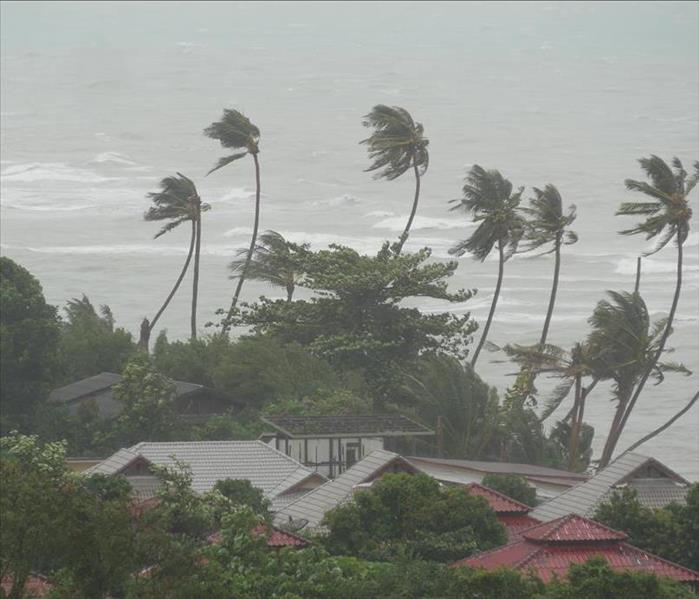 If your Northeast Florida home experience storm damage from a hurricane or tropical storm we're here to help! Call us 24/7 and we'll send someone out.
If your Northeast Florida home experience storm damage from a hurricane or tropical storm we're here to help! Call us 24/7 and we'll send someone out.
If a storm has violent winds, heavy rains, and creates a storm surge, what is it called? Is it a hurricane or a typhoon? Where do tropical storms fit into the picture? Weather terminology can be confusing, but we can help you understand the differences between these kinds of storms.
Hurricane and typhoon are two different terms for the same weather phenomenon. In short, they’re tropical cyclones, rotating, organized systems of clouds and thunderstorms that originate over tropical or subtropical waters and have closed, low-level circulation. For a storm to be considered a hurricane or a typhoon, the tropical cyclone must have 74 mph or higher sustained winds. They can occur at any time of year, but there are seasons during which these storms are most common. If the two storms are the same thing, though, why do they have different names? It has to do primarily with the location.
- Hurricanes are cyclones located in the North Atlantic Ocean, the central North Pacific Ocean, and the eastern North Pacific Ocean. They’re rated between Category 1 through Category 5 by the national hurricane center. Hurricane season runs from June 1st to November 30th.
- Typhoons are cyclones that originate in the Northwest Pacific Ocean. They are generally stronger than hurricanes, but they do less damage because of where they’re located. Typhoons commonly occur from May to October.
- In the South Pacific and Indian Oceans, they are simply called tropical cyclones. The cyclone season runs from November to April.
These types of storms form when air is heated by warm seawater, causing the air to rise quickly. As it cools down again, more warm air rises below and pushes it aside. This cycle creates strong winds, and when it happens over the sea, the result can be huge waves. Scientists believe that the intensity of hurricanes will increase in the future because the temperature of ocean water is rising.
Of course, there are different stages of storms leading up to the formation of a hurricane or typhoon. The first stage is a tropical depression, sometimes referred to as a tropical wave, disturbance, feature, or system. This is a cyclone with winds of 38 miles per hour. When a cyclone’s wind speeds reach 39 to 73 miles per hour, it becomes a tropical storm. At that point, you’ll see it on the hurricane tracker, classified on the same scale as hurricanes. The U.S. National Hurricane Center (NHC) issues advisories based on information collected through reconnaissance aircraft missions, vessels, equipment located on islands, and buoys so that people can keep track of local storms and protect their homes and businesses.
If your Northeast Florida home is damaged in a hurricane or tropical storm, call SERVPRO of Mandarin. Our highly-trained restoration technicians have the experience and equipment to restore your Jacksonville home to its pre-storm condition. A trusted leader in the restoration industry, we’ve served our community for more than 40 years. Call (904) 636-0044 or contact us through our website.
How Much Water Damage Do Hurricanes Cause?
7/11/2021 (Permalink)
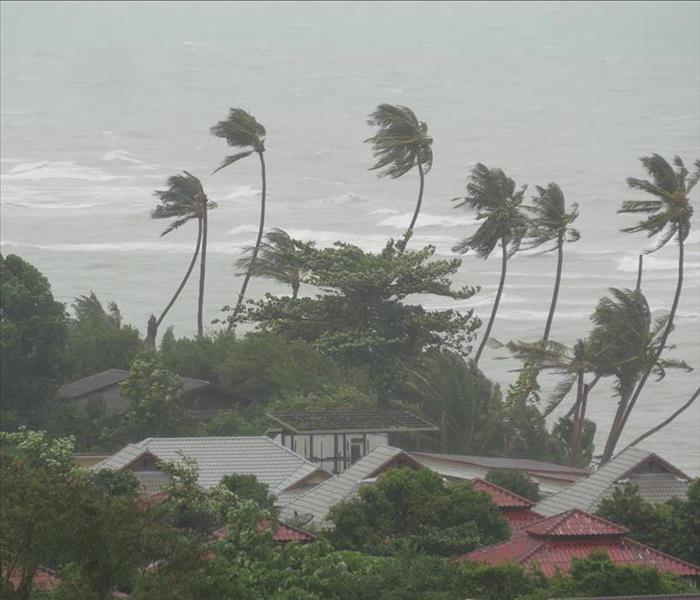 If your Northeast Florida home experiences damage from a storm, call us to help right away!
If your Northeast Florida home experiences damage from a storm, call us to help right away!
For people who live in hurricane-prone areas, news of a hurricane can seem mundane. Especially if you’ve never personally experienced hurricane damage, you may think they are overhyped. In truth, though, hurricanes do a great deal of damage each year.
According to the National Oceanic and Atmospheric Administration (NOAA), there were 28 weather disasters between 2019 and 2020 that each caused more than $1 billion of damage. In fact, a 2019 report from the nonpartisan Congressional Budget Office (CBO) projected the annual economic losses from hurricane winds and flooding to be about $54 billion, with $34 billion of that damage happening to homes. Hurricane damage in Florida is not something to ignore, because Florida is hit by more hurricanes than any other state: 121 hurricanes, 37 of them major, since 1851.
Why is hurricane damage so serious? Hurricanes are extremely intense storms, bringing high-velocity winds, waves, tornadoes, and floodwaters. They are ranked in terms of severity on a scale of 1 to 5, with 5 being the most destructive. A Category 1 Hurricane has winds that range from 74 to 95 miles per hour and may cause only minor damage. By contrast, a Category 5 Hurricane can bring winds of up to 157 miles per hour, which can destroy the roof and walls of a house. A Category 5 Hurricane can also cause power outages and knock down trees. A hurricane does not have to be a Category 5 to cause major damage though, because damage from Categories 3 and 4 can be almost as extreme.
Flood damage is perhaps the most devastating aspect of a hurricane. Hurricanes cause flooding in different ways, as storm surge pushes seawater onto the shore and heavy rains drench even inland areas. Entire regions can end up flooded for days. When that region includes your home, water damage can be extensive. Because water weighs about 1,700 pounds per cubic yard, it can be brutal on structures not meant to take that kind of force.
Water can damage your home in several different ways. It can cause floor dampness. If you have lived in Florida for any length of time you know that dampness inside your home is not going to dry out on its own. In fact, if your floor is soaked in a hurricane, you may end up having to tear up flooring, baseboards, and even your drywall. If you sustain a roof leak, you could end up needing mold remediation. What’s more, water damage from rising floodwaters is often polluted and can be dangerous. You will need professional help removing that water from your house.
If your Northeast Florida home is damaged in a hurricane or tropical storm, call SERVPRO of Mandarin. Our highly-trained restoration technicians have the experience and equipment to restore your Northeast Florida home to its pre-storm condition. A trusted leader in the water restoration industry, we have served our community for more than 40 years. Call (904) 636-0044 or contact us through our website.
Ensuring Your Home's Prepared for a Hurricane
6/23/2021 (Permalink)
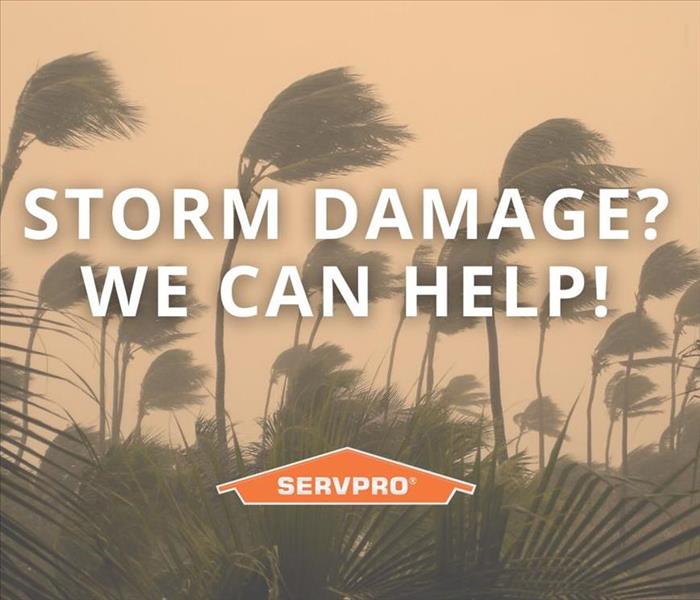 We're here to help quickly restore your home to like new condition when you face storm damage!
We're here to help quickly restore your home to like new condition when you face storm damage!
Preparing Your Home for a Hurricane
Hurricane season begins June 1st and lasts until November, and if you live in a coastal town, hurricane preparedness is vital for keeping your home and family safe. Will you be ready if there is a hurricane? Here are some steps for preparing your home.
- Make a storm kit. This kit should have supplies to get your family through 48 hours of bad conditions, with no electricity, water, or other basic services. It should have three days’ worth of water and a two day supply of food, as well other important provisions. Ready.gov offers a list of supplies here.
- Gas up your generator. If you have a 5,500 watt generator, it will require about five gallons of gasoline to run for eight hours. Fill up some gas cans so that you’ll be prepared if emergency conditions last for several days.
- Bring things inside from outside. Lawn furniture, toys, garden tools, and anything else that could be blown away in the storm should come inside. Anything you can’t bring inside should be anchored.
- Know the location of your water, gas, and electricity shut offs. After a disaster, it’s recommended that you shut off your water until you know it’s safe to drink. If your home experiences flooding or severe water damage, we recommend shutting off your electricity as well. Don’t turn off your gas until local officials tell you to do so.
- Get your windows, doors, and garage doors ready for the storm. Ideally, you’ve installed storm shutters on your windows, in which case you’ll just need to brace your doors and secure your garage door. If your windows don’t have storm shutters, plywood or other hard materials can be temporarily affixed to the exterior for protection from wind and flying objects.
- Turn down your refrigerator and freezer. Lowering your refrigerator and freezer to their lowest setting cools the food so that it will stay cold for a while if the power goes out.
- If the power goes out, unplug your electrical appliances. This will keep them from being damaged if there’s a power surge when the electricity comes back on.
- Get your insurance documents together. Your home insurance documents and other important papers should go into a waterproof bag to be kept inside your storm kit. You will need them readily available should your experience damage because they’ll make things easier in the aftermath of the storm.
- Have a plan for your pets. Your pets should be microchipped, and you should have a picture of each pet handy in case they get lost in the storm. Because emergency shelters do not always accept pets, make a plan for where they will go in an emergency if you are unable to bring them with you.
Sometimes homes sustain damage, even if you’re as prepared as possible for the storm. If your Jacksonville area home is damaged in a hurricane or tropical storm, call SERVPRO of Mandarin. Our highly-trained restoration technicians have the experience and equipment to restore your home to like new, "Like it never even happened." A trusted leader in the water restoration industry, we’ve served our community for more than 40 years. Call (904) 246-6118 or contact us through our website.
Do You Have a Hurricane Evacuation Plan?
6/23/2021 (Permalink)
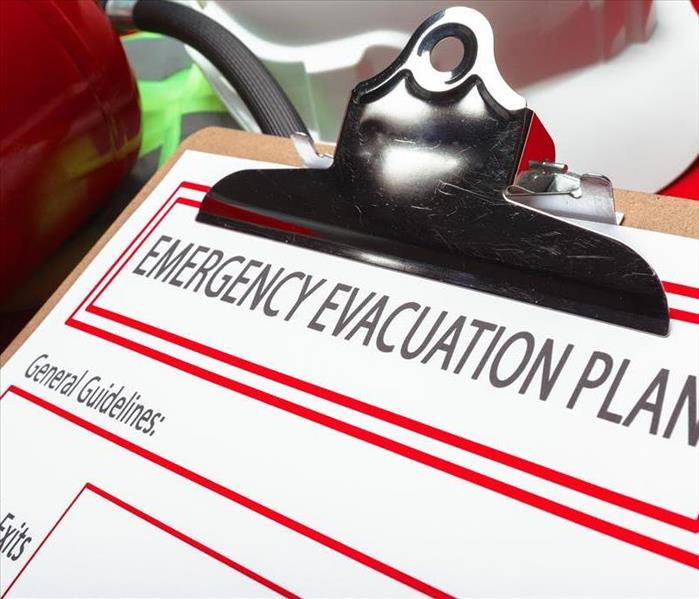 In case it's required, it's important to have an evacuation plan! If your home is damaged by a storm, SERVPRO of Mandarin is here to help.
In case it's required, it's important to have an evacuation plan! If your home is damaged by a storm, SERVPRO of Mandarin is here to help.
Do you have a hurricane evacuation plan? Hurricane season began June 1st and lasts until November, and if you live near a coastal town, hurricane preparedness is vital for keeping your family safe. Even if you do not think you’ll want to evacuate, there may come a time when officials make it mandatory. A Florida hurricane can quickly become dangerous and may not leave you much time. Planning will help make the experience much easier and more comfortable.
- Keep track of the local weather. Sign up for alerts from the National Weather Service so that you will know if a hurricane watch or warning is in effect for your area.
- Decide on a destination. Where will you wait out the storm? You can choose to stay with out-of-town friends or family, rent a hotel room, or stay at a local shelter, but it’s important to know where you’re going and map it out in advance. If you have pets, make sure to include them in your plans. If it’s not safe for you to be home it’s not safe for your pets. Choose a place to stay that accepts pets or make other arrangements for your furry family members.
- Pick your route and plan for detours. Your local government will offer suggested routes to make it easier to get to safety, but it’s smart to know at least three ways to get to your destination. You never know if a road is going to be blocked by flooding, a washed-out bridge, or downed trees. Throughout hurricane season, keep your gas tank full. That way you’ll be sure you have enough gas to get you where you’re going even if you run into trouble. Additionally, it will keep you out of the long lines that inevitably form at gas stations during natural disasters.
- Be thorough with emergency supplies. Keep an emergency kit in the trunk of your car with fresh water, non-perishable snacks, blankets, a phone charger, road maps, garbage bags, toilet paper, paper towels, a gas can, jumper cables, and a towline. Each family member should have a bag with changes of clothes and a copy of the evacuation plan. Additionally, have a hurricane preparedness kit that’s easy to grab, like a backpack, containing:
- Copies of important documents
- Flashlights and batteries
- Battery-powered radio
- Medications
- Cash
- Extra keys for your house and car
- Know who to call. Make plans with your family members in case you are separated. Decide upon a meeting spot or two where you will reconnect, and pick an out-of-state friend or family member to call with updates.
If your Mandarin area home is damaged in a hurricane or tropical storm, call SERVPRO of Mandarin. Our highly-trained restoration technicians have the experience and equipment to restore Mandarin area home to its pre-storm condition. A trusted leader in the water restoration industry, we have served our community for more than 40 years. Call (904) 246-6118 or contact us through our website.
When Storms and Floods Hit Jacksonville, SERVPRO of Mandarin is Ready!
4/20/2021 (Permalink)
SERVPRO of Mandarin specializes in storm and flood damage restoration. Our crews are highly trained and we use specialized equipment to restore your property to its pre-storm condition.
Faster Response
Since we are locally owned and operated (since 1981), we are able to respond quicker with the right resources, which is extremely important. A fast response lessens the damage, limits further damage, and reduces the restoration cost.
Resources to Handle Floods and Storms
When storms hit Jacksonville, we can scale our resources to handle a large storm or flooding disaster. We can access equipment and personnel from a network of 1,750 franchises across the country and elite Disaster Recovery Teams that are strategically located throughout the United States.
Have Storm or Flood Damage? Call Us Today at 904-636-0044. Like us on Facebook!
Facts About Tornadoes
1/13/2021 (Permalink)
Tornadoes cause widespread damage throughout the United States, especially in the southeast and Southern Plains. But how much do know about their destructive forces that tear through our homes and businesses?
Here are a couple of quick facts about tornadoes:
- The average tornado travels Southwest to Northeast but has been known to move in any direction.
- T. Theodore Fujita devised the F0-F5 Scale for tornadoes in 1971.
- Tornadoes are most likely to occur between 3 pm and 9 pm but can occur at any time.
- In 2006 the National Weather Service unveiled the Enhanced Fujita Scale (EF Scale).
- The USA averages around 1,200 tornadoes every year, more than any other country.
- A tornado normally appears transparent until it picks dust and mud from the ground.
- In the southern hemisphere tornadoes usually, rotate in a clockwise direction. In the northern hemisphere tornadoes usually, rotate in a counterclockwise direction.
Signs of Danger
- Large hail
- Dark, green-tinted sky
- Low-lying rotating cloud
- Loud roar similar to a freight train
We are in the peak of storm season here in Florida and encourage everyone to be weather aware. Have a family plan in the event of a tornado warning. Know where your safe areas are wherever you are.
Have Storm Damage? Call SERVPRO of Mandarin, 904-636-0044.
Are You Prepared for an Emergency or Power Outage?
6/5/2020 (Permalink)
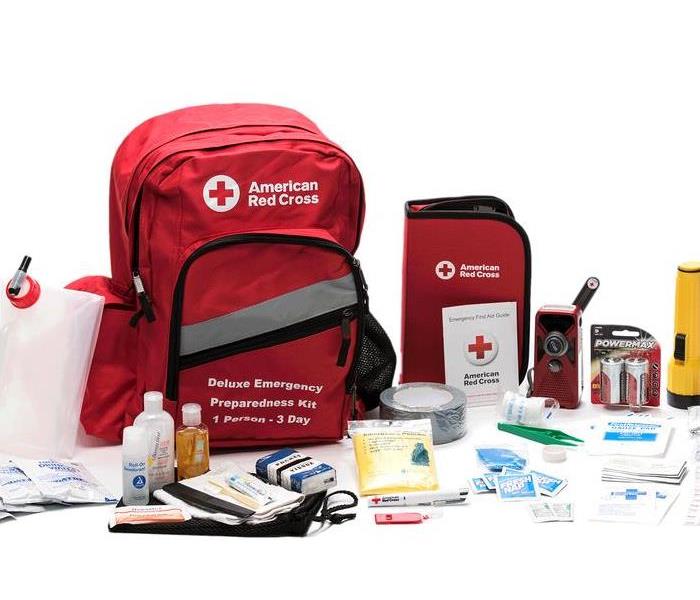 Knowing what to do until help arrives is the first step to being prepared.
Knowing what to do until help arrives is the first step to being prepared.
You may need to survive on your own after an emergency for several days, sometimes up to a week. This means having your own food, water and other supplies in sufficient quantity to last for at least 72 hours, or until emergency crews arrive. Local officials and relief workers will be on the scene after a disaster, but they cannot reach everyone immediately. The nature of the disaster road conditions or flood waters may prevent help from arriving in a timely manner.
Additionally, basic services such as electricity, gas, sewage treatment, water and telephones may be cut off. Your supplies kit should contain items to help you manage during these outages.
If the power goes out keep your pipes from freezing by shutting off the valve that allows water to come into your home. Then, open any drain valves and all faucets and let them run until the pipes are empty (it's helpful to identify these valves in advance). Next, flush all toilets and pour denatured alcohol into toilets and sinks to prevent water in the traps from freezing. Do NOT use automotive antifreeze in case there's trouble with your water system; you don't want the antifreeze to contaminate your drinking water. You may, however, use nontoxic antifreeze that's made for winterizing motor homes.
Be prepared for a power outage by keeping necessary items centrally located in your home. Take the time to ensure that everyone in your family is aware of the "kit." Periodically check your kit to see that batteries operate properly. The following is a list of items that are suggested:
1. Flashlights for each family member
2. Battery-operated radio and clock
3. Extra batteries
4. Containers of bottled water (at least 1 gallon, per person, per day)
5. Canned, freeze-dried or dehydrated food, powdered milk, baby supplies for infants
6. Non-electric can opener
7. List of important phone numbers
8. First-aid kit
9. Prescriptions
Stock canned foods, dry mixes and other staples that do not require refrigeration, cooking, water or special preparation. Be sure to include a manual can opener and eating utensils. The following items are suggested when selecting emergency food supplies. You may already have many of these on hand.
•Store at least a three-day supply of non-perishable food.
•Choose foods your family will eat.
•Remember any special dietary needs.
•Avoid foods that will make you thirsty.
•Choose salt-free crackers, whole grain cereals and canned foods with high liquid content.
•Ready-to-eat canned meats, fruits, vegetables and a can opener
•Protein or fruit bars
•Dry cereal or granola
•Peanut butter
•Dried fruit
•Nuts
•Crackers
•Canned juices
•Non-perishable pasteurized milk
•High energy foods
•Vitamins
•Food for infants
•Comfort/stress foods
These and many other helpful tips are available at ready.gov. Here is the link to tips for before, during, and after a severe weather event; http://www.ready.gov/severe-weather and https://www.ready.gov/build-a-kit. When severe storms strike Florida’s First Coast knowing what to do until SERVPRO of Mandarin arrives will make a difference. Contact us at 904-636-0044.
SERVPRO of Mandarin is On-Site Quickly to Minimize Storm Damage
6/3/2020 (Permalink)
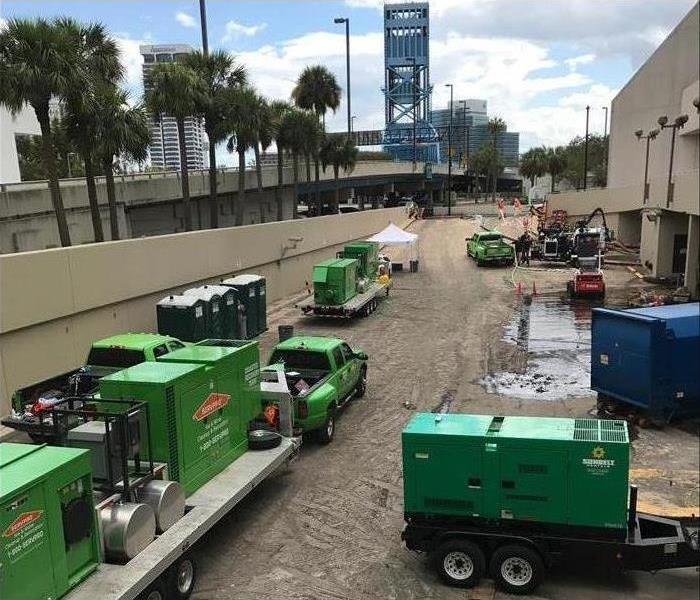 SERVPRO Large Loss Response Teams help remediate storm and flood damage no matter the size of the loss.
SERVPRO Large Loss Response Teams help remediate storm and flood damage no matter the size of the loss.
The weather in Northeast Florida can be unpredictable. You never know when a severe thunderstorm or other natural disaster is going to blow through town. Storm damage happens fast. Gusting winds knock down structures, hail damages roofs, lightning strikes, debris flies into buildings, and ongoing rain floods offices. When something like this happens, you don’t have to face it alone. Choose locally owned SERVPRO of Mandarin for the service you can trust. For 37 years SERVPRO of Mandarin has been serving Jacksonville communities providing fast, reliable and professional service.
Your Resource for 24/7 Emergency Support
SERVPRO is on call 24 hours a day, seven days a week. That means you can call us any time, day or night when facing weather-related damage. What’s more, we will send an expert crew immediately to help. Our quick response to emergency situations not only gives you help right when you need it, but also it can result in lower storm damage repair costs and/or limited contents damage for your business or home.
How Our Expert Storm Damage Restorations Solutions Work
The production staff at SERVPRO of Mandarin has the expertise and experience required to minimize potential damage and secure your property. Once you contact us about a specific natural disaster or weather damage restoration project, here is how our process works:
- A SERVPRO of Mandarin Production Manager or Crew Chief is on-site within one hour of your emergency call.
- Our team assesses the weather-related damages at your site.
- We create a plan for restoring your property to its preloss condition.
- We mobilize the specialized equipment required to mitigate secondary damage and loss.
- SERVPRO of Mandarin production team monitors the situation throughout the entire restoration process.
When you need work done at your property, SERVPRO of Mandarin stands ready to provide you fast and effective storm damage cleanup and relief. Call us anytime, 24/7/365 at 904-636-0044.
Hurricane Season is Here, 5 Preparedness Tips to Do Today
6/1/2020 (Permalink)
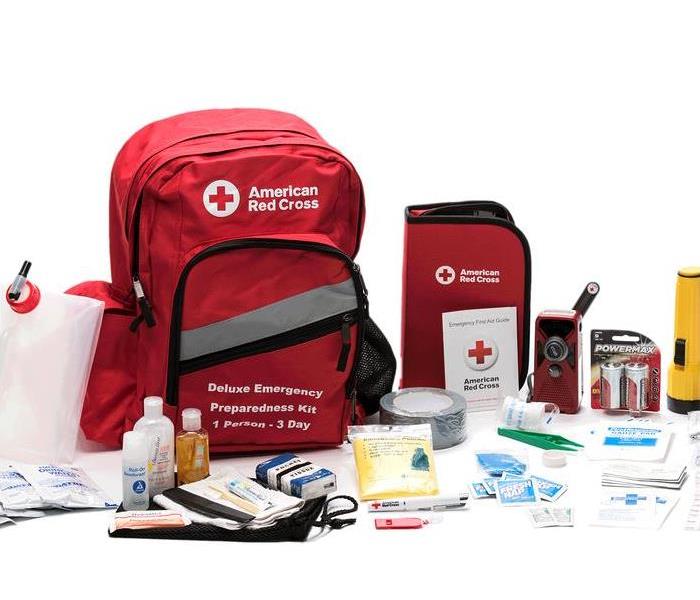 have your Emergency Kit Ready in time for this year's storm season to keep your family safe.
have your Emergency Kit Ready in time for this year's storm season to keep your family safe.
Hurricane season has arrived and SERVPRO of Mandarin has preparedness steps that families and individuals can do today before the next storm approaches.
While the National Oceanic and Atmospheric Administration (NOAA) predicted a near-normal 2016 Atlantic hurricane season with 10 to 61 named storms, it is important to remember that it only takes one hurricane to devastate a community. In addition, caution cannot be limited to coastal states. Hurricanes can be just as destructive for inland communities.
5 Hurricane Preparedness Tips to Tackle Today
1. Download the Red Cross Emergency App.
This new app provides expert advice on what to do before, during, and after hurricanes and other disasters. It also gives instant access to 35 customizable weather alerts, safety tips and preparedness information for 14 different emergencies; all in one free and easy to use.
2. Learn the difference between a Hurricane Watch and a Hurricane Warning.
As hurricane season approaches, it is also important to know the difference between the threat levels.
? A Hurricane Watch is when conditions are a threat within 48 hours. It’s then time to review and update your hurricane plan. Get ready to act if a warning is issued, and stay informed.
? A Hurricane Warning is when conditions are expected within 36 hours. It’s then time to complete your storm preparations and leave the area if directed to do so by authorities.
3. Create an evacuation plan for your family.
Planning and practicing your evacuation plan minimizes confusion and fear during the event. Find out about your community’s hurricane response plan. Plan routes to local shelters, register family members with special medical needs and make plans for your pets to be cared for. Obey evacuation orders. Avoid flooded roads and washed-out bridges.
4. Build an emergency kit.
The Red Cross advises that you should include a gallon of water per person, per day, non-perishable food, a flashlight, battery-powered radio, first aid kit, medications, supplies for an infant if applicable, a multi-purpose tool, personal hygiene items, copies of important papers, cell phone chargers, extra cash, blankets, maps of the area and emergency contact information.
5. Pay attention to the weather forecast and stay informed.
Listen to an NOAA Weather Radio or critical information from the National Weather Service (NWS)
6. Download the SERVPRO Ready Plan App.
This is an invaluable tool if you own a home or commercial building. The SERVPRO Ready Plan App is a part of the SERVPRO Emergency Ready Profile which is a start-up approach that provides critical information needed to begin mitigation and recovery services.
SERVPRO of Mandarin provides emergency service 24/7/365. Our team of professionals are committed to providing fire, water and biohazard cleanup and restoration services for all Jacksonville communities and business. SERVPRO of Mandarin also offers top-quality professional cleaning services for all Jacksonville homes and businesses. Call us anytime and speak to a SERVPRO professional, at 904-636-0044.
Keep Your Family Prepared for Disaster in Northeast Florida
5/29/2020 (Permalink)
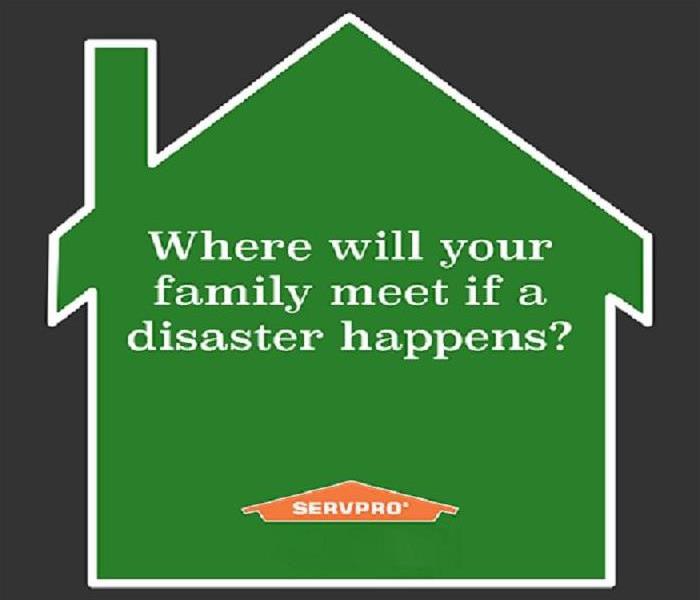 Being prepared for a disaster is the first step to keeping your family safe, and weathering the storm.
Being prepared for a disaster is the first step to keeping your family safe, and weathering the storm.
Keep your family prepared in 2020 with this Emergency Checklist from our partners at the American Red Cross.
1. A gallon of water per person, per day.
2. Supply of non-perishable packaged or canned food and a manual can opener.
3. Change of clothing, rain gear, and sturdy shoes.
4. First aid kit and prescription medications.
5. Battery-powered radio, flashlight and plenty of extra batteries.
6. Credit cards, cash, and an extra set of home and car keys.
7. List of family physicians.
8. Special items of elderly or infant family members.
Do not forget to make arrangements for pets.
Visit the American Red Cross for more information, and call SERVPRO of Mandarin at 904-636-0044 if you experience property damage related to storms.
Water Damage and Flood Water Removal
4/8/2020 (Permalink)
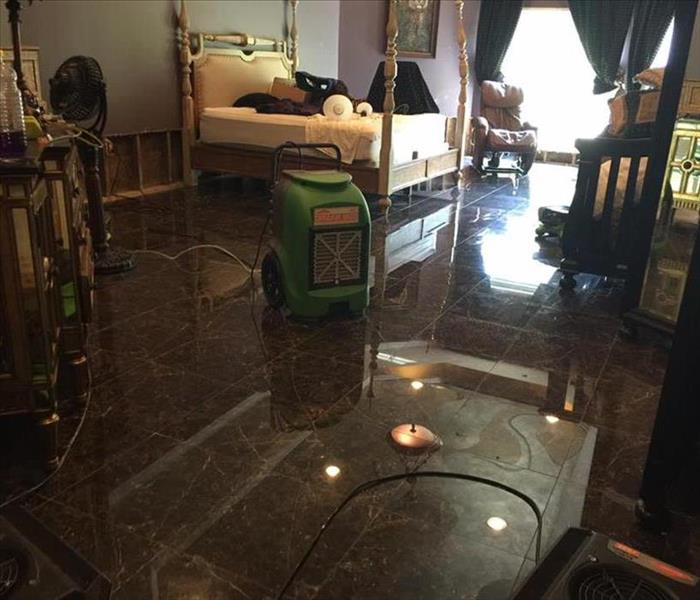 If your home suffers flood damage call SERVPRO of Mandarin, 904-636-0044.
If your home suffers flood damage call SERVPRO of Mandarin, 904-636-0044.
Water damage can cost home owners thousands of dollars to fix. When water gets into a structure and it is dried incorrectly, the wood can rot and mold and mildew can form making the occupants extremely ill. Trained and certified to the highest standards in the industry, our professional production team responds immediately - 24 hours a day, 7 days a week - to mitigate loss and meet every challenge with professionalism, reliability, compassion and respect. Our technicians identify the full extent of moisture damage, both obvious and unseen, by using sensors such as moisture detectors and state of the science technology.
Meanwhile, we help homeowners overcome their feeling of helplessness by explaining the process in a way that they can understand what is happening, what to expect, and what they can do. SERVPRO of Mandarin’s commitment to customer excellence includes insurance professionals; which means that insurance agents and claims adjusters can expect effective, ongoing communication and reporting. We understand insurance industry requirements. Our professional production team will provide a complete estimate, including photos, to the agent or adjuster within 24-48 hours.
Call SERVPRO of Mandarin and get quality water damage restoration services, fire and smoke damage restoration, mold and mildew removal and if your home, business or insurance customer needs one of our large selection of biohazard removal services, we are ready, trained and equipped to provide you with any clean up, mitigation and restoration service. Call us today at 904-636-0044 or like us on Facebook for more safety tips.
September is National Preparedness Month
1/2/2020 (Permalink)
SERVPRO of Mandarin wants to encourage individuals, families, businesses and communities to take action! September is an ideal time for individuals and families to update their emergency supply kits and family emergency plans and to become better informed about different threats and local emergency plans. Many things can change over the course of a year, and it is imperative that the entire family have the most up-to-date emergency contact information and a family emergency plan as they head back to school and work. It’s about talking to your families and figuring out what you should do if an emergency happens in your community. Where will we meet? What emergency supplies will we need and where should we keep them?
One of our missions at SERVPRO® of Mandarin has always been to contribute to the communities where we live and work. This month we have an extraordinary opportunity to make a difference by joining forces with companies and communities throughout Northeast Florida to help prepare our families, friends, colleagues, neighbors and communities for emergencies, whether naturally occurring or man-made.
One simple thing that individuals and families can do to be prepared is to have a family emergency plan. To develop one we should ask ourselves some important questions such as, “In the event of an emergency, is there a safe place for my family to meet?” This is especially important if you aren’t allowed back into your home or neighborhood. “What is the evacuation location and plan of my child’s school?” “Does everyone in the family have one another’s contact information and the contact for an out-of-town relative to take roll-call?”
Are You Prepared?
10/29/2019 (Permalink)
"What would your family do? Would you know where to meet?" Talk to your family about these important issues! You never know when a disaster could strike.
It is important at least once a year to get together with your family and come up with a plan. The following is a list of some important things to consider when getting you family's plan in place.
-"Where will we meet if our neighborhood is evacuated, or we are not allowed to go home by law enforcement?"
-"Is there a trusted neighbor, friend, or relative that can pick up the kids if parents can not get to them? Are they already on the pre-approved pick-up list for that child's school?"
-"Do you have a list of medications handy, and are they up to date which prescriptions filled regularly? This includes pets as well."
-"Make a list of shelters that allow pets ahead of time, and have a plan in place for pets if you cannot get them to a shelter. If you are staying with a relative, make sure your pet can come to, and purchase supplies ahead of time so your pet will be comfortable on a spare of the moment road trip."
-"If you have an elderly family member/friend, or a special needs family member/friend in an assisted living facility, learn that facility's evacuation plan and ask questions. Will they provide transportation for that family member, or will you need to get them? What would you do if you couldn't get to them, or got separated?"
-"Make a disaster kit! If you are riding out a disaster or are in a voluntary evacuation zone, you could be without water or power for days. Include water, non-perishable food, first aid kit, medications, pet supplies and pet food, flashlights, batteries, crank radio, wet wipes, and cleaning supplies you don't need water to use. Ever toilet paper and paper towels are also a good idea. Fill up your bath tub with water before disaster strikes so you can use that water to flush your toilets."
Be Prepared For a Hurricane
10/29/2019 (Permalink)
How to Prepare for a Hurricane.....
Hurricanes are massive storm systems that form over ocean water and often move toward land. Threats from hurricanes include high winds, heavy rainfall, storm surge, coastal and inland flooding, rip currents, and tornadoes. The heavy winds of hurricanes can cause damage or destroy homes, buildings, and roads, as well as cause power, water, and gas outages. These effects can injure or kill people, disrupt transportation, and pollute drinking water. Hurricanes cause deaths and injuries primarily from drowning, wind, and wind-borne debris. The impact from hurricanes can extend from the coast to several hundred miles inland.
To find your risk, visit FEMA’s “Know Your Risk Map.” Be better prepared for this hurricane season, and learn more at ready.gov/prepare. Now/Prepare Sign up for local alerts and warnings. Monitor local news and weather reports. Prepare to evacuate by testing your emergency communication plan(s), learning evacuation routes, having a place to stay, and packing a “go bag.” Stock emergency supplies. Protect your property by installing sewer backflow valves, anchoring fuel tanks, reviewing insurance policies, and cataloging belongings. Collect and safeguard critical financial, medical, educational, and legal documents and records. During/Survive Follow guidance from local authorities. If advised to evacuate, grab your “go bag” and leave immediately. For protection from high winds, stay away from windows and seek shelter on the lowest level in an interior room. Move to higher ground if there is flooding or a flood warning. Turn Around Don’t Drown.® Never walk or drive on flooded roads or through water. Call 9-1-1 if you are in life threatening danger.
After/Be Safe Return to the area only after authorities say it is safe to do so. Do not enter damaged buildings until they are inspected by qualified professionals. Never walk or drive on flooded roads or through floodwaters. Look out for downed or unstable trees, poles, and power lines. Do not remove heavy debris by yourself. Wear gloves and sturdy, thick-soled shoes to protect your hands and feet. Do not drink tap water unless authorities say it is safe.
Hurricane Preparedness
9/24/2019 (Permalink)
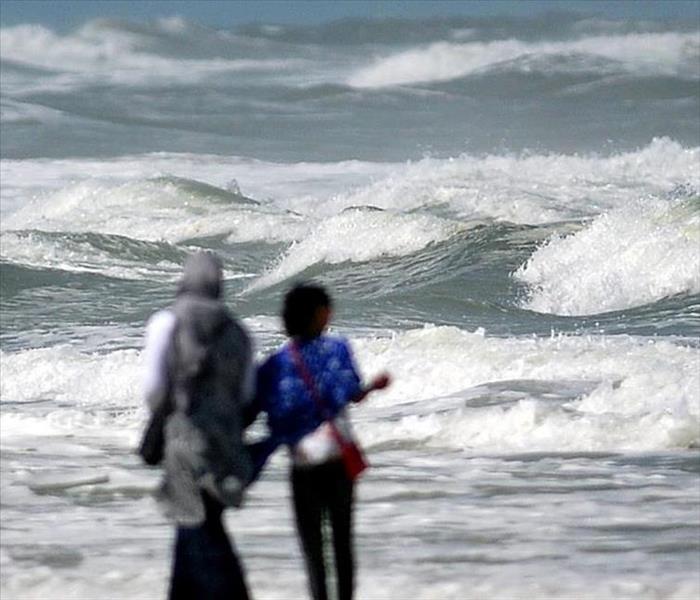 Hurricane Dorian
Hurricane Dorian
Hurricanes are massive storm systems that form over warm ocean waters and move toward land. Potential threats from hurricanes include powerful winds, heavy rainfall, storm surges, coastal and inland flooding, rip currents, tornadoes, and landslides. The Atlantic hurricane season runs from June 1 to November 30. The Pacific hurricane season runs May 15 to November 30. Hurricanes:
- Can happen along any U.S. coast or in any territory in the Atlantic or Pacific oceans.
- Can affect areas more than 100 miles inland.
- Are most active in September.
IF YOU ARE UNDER A HURRICANE WARNING, FIND SAFE SHELTER RIGHT AWAY
- Determine how best to protect yourself from high winds and flooding.
- Evacuate if told to do so.
- Take refuge in a designated storm shelter, or an interior room for high winds.
- Listen for emergency information and alerts.
- Only use generators outdoors and away from windows.
- Turn Around, Don’t Drown! Do not walk, swim, or drive through flood waters.
Storm Surge
Storm surge is water from the ocean that is pushed toward the shore by the force of the winds swirling around a hurricane. Storm surge is fast and can produce extreme coastal and inland flooding. When hurricanes cause storm surge, over 20 feet of water can be produced and pushed towards the shore and several miles inland destroying property and endangering lives in its path.
Be Informed
Storm surge is historically the leading cause of hurricane-related deaths in the United States.
Water weighs about 1,700 pounds per cubic yard, so battering waves from surge can easily demolish buildings and cause massive destruction along the coast.
Storm surge undermines roads and foundations when it erodes material out from underneath them.
Just one inch of water can cause $25,000 of damage to your home. Homeowners and renter’s insurance do not typically cover flood damage.
Prepare NOW
- Know your area’s risk of hurricanes.
- Sign up for your community’s warning system. The Emergency Alert System (EAS) and National Oceanic and Atmospheric Administration (NOAA) Weather Radio also provide emergency alerts.
- If you are at risk for flash flooding, watch for warning signs such as heavy rain.
- Practice going to a safe shelter for high winds, such as a FEMA safe room or ICC 500 storm shelter. The next best protection is a small, interior, windowless room in a sturdy building on the lowest level that is not subject to flooding.
- Based on your location and community plans, make your own plans for evacuation or sheltering in place.
- Become familiar with your evacuation zone, the evacuation route, and shelter locations.
- Gather needed supplies for at least three days. Keep in mind each person’s specific needs, including medication. Don’t forget the needs of pets.
- Keep important documents in a safe place or create password-protected digital copies.
- Protect your property. Declutter drains and gutters. Install check valves in plumbing to prevent backups. Consider hurricane shutters. Review insurance policies.
When a hurricane is 36 hours from arriving
- Turn on your TV or radio in order to get the latest weather updates and emergency instructions.
- Restock your emergency preparedness kit. Include food and water sufficient for at least three days, medications, a flashlight, batteries, cash, and first aid supplies.
- Plan how to communicate with family members if you lose power. For example, you can call, text, email or use social media. Remember that during disasters, sending text messages is usually reliable and faster than making phone calls because phone lines are often overloaded.
- Review your evacuation zone, evacuation route and shelter locations. Plan with your family. You may have to leave quickly so plan ahead.
- Keep your car in good working condition, and keep the gas tank full; stock your vehicle with emergency supplies and a change of clothes.
- If you have NFIP flood insurance, your policy may cover up to $1000 in loss avoidance measures, like sandbags and water pumps, to protect your insured property. You should keep copies of all receipts and a record of the time spent performing the work. They should be submitted to your insurance adjuster when you file a claim to be reimbursed.
When a hurricane is 18-36 hours from arriving
- Bookmark your city or county website for quick access to storm updates and emergency instructions.
- Bring loose, lightweight objects inside that could become projectiles in high winds (e.g., patio furniture, garbage cans); anchor objects that would be unsafe to bring inside (e.g., propane tanks); and trim or remove trees close enough to fall on the building.
- Cover all of your home’s windows. Permanent storm shutters offer the best protection for windows. A second option is to board up windows with 5/8” exterior grade or marine plywood, cut to fit and ready to install.
When a hurricane is 6-18 hours from arriving
- Turn on your TV/radio, or check your city/county website every 30 minutes in order to get the latest weather updates and emergency instructions.
- Charge your cell phone now so you will have a full battery in case you lose power.
When a hurricane is 6 hours from arriving
- If you’re not in an area that is recommended for evacuation, plan to stay at home or where you are and let friends and family know where you are.
- Close storm shutters, and stay away from windows. Flying glass from broken windows could injure you.
- Turn your refrigerator or freezer to the coldest setting and open only when necessary. If you lose power, food will last longer. Keep a thermometer in the refrigerator to be able to check the food temperature when the power is restored.
- Turn on your TV/radio, or check your city/county website every 30 minutes in order to get the latest weather updates and emergency instructions.
Survive DURING
- If told to evacuate, do so immediately. Do not drive around barricades.
- If sheltering during high winds, go to a FEMA safe room, ICC 500 storm shelter, or a small, interior, windowless room or hallway on the lowest floor that is not subject to flooding.
- If trapped in a building by flooding, go to the highest level of the building. Do not climb into a closed attic. You may become trapped by rising flood water.
- Listen for current emergency information and instructions.
- Use a generator or other gasoline-powered machinery outdoors ONLY and away from windows.
- Do not walk, swim, or drive through flood waters. Turn Around. Don’t Drown! Just six inches of fast-moving water can knock you down, and one foot of moving water can sweep your vehicle away.
- Stay off of bridges over fast-moving water.
Be Safe AFTER
- Listen to authorities for information and special instructions.
- Be careful during clean-up. Wear protective clothing and work with someone else.
- Do not touch electrical equipment if it is wet or if you are standing in water. If it is safe to do so, turn off electricity at the main breaker or fuse box to prevent electric shock.
- Avoid wading in flood water, which can contain dangerous debris. Underground or downed power lines can also electrically charge the water.
- Save phone calls for emergencies. Phone systems are often down or busy after a disaster. Use text messages or social media to communicate with family and friends.
- Document any property damage with photographs. Contact your insurance company for assistance.
Getting Prepared
8/29/2019 (Permalink)
Hurricane season has arrived and SERVPRO of Mandarin has preparedness steps that families and individuals can do today, before the next storm approaches.
While the National Oceanic and Atmospheric Administration (NOAA) predicted a near-normal 2016 Atlantic hurricane season with 10 to 61 named storms, it is important to remember that it only takes one hurricane to devastate a community. In addition, caution cannot be limited to coastal states. Hurricanes can be just as destructive for inland communities.
5 Hurricane Preparedness Tips to Tackle Today
1. Download the Red Cross Emergency App.
This new app provides expert advice on what to do before, during, and after hurricanes and other disasters. It also gives instant access to 35 customizable weather alerts, safety tips and preparedness information for 14 different emergencies; all in one free and easy to use app
2. Learn the difference between a Hurricane Watch and a Hurricane Warning.
As hurricane season approaches, it is also important to know the difference between the threat levels.
? A Hurricane Watch is when conditions are a threat within 48 hours. It’s then time to review and update your hurricane plan. Get ready to act if a warning is issued, and stay informed.
? A Hurricane Warning is when conditions are expected within 36 hours. It’s then time to complete your storm preparations and leave the area if directed to do so by authorities.
3. Create an evacuation plan for your family.
Planning and practicing your evacuation plan minimizes confusion and fear during the event. Find out about your community’s hurricane response plan. Plan routes to local shelters, register family members with special medical needs and make plans for your pets to be cared for. Obey evacuation orders. Avoid flooded roads and washed out bridges.
4. Build an emergency kit.
The Red Cross advises that you should include a gallon of water per person, per day, non-perishable food, a flashlight, battery-powered radio, first aid kit, medications, supplies for an infant if applicable, a multi-purpose tool, personal hygiene items, copies of important papers, cell phone chargers, extra cash, blankets, maps of the area and emergency contact information.
5. Pay attention to the weather forecast and stay informed.
Listen to a NOAA Weather Radio or critical information from the National Weather Service (NWS)
6. Download the SERVPRO Ready Plan App.
This is an invaluable tool if you own a home or commercial building. The SERVPRO Ready Plan App is a part of the SERVPRO Emergency Ready Profile which is a start up approach that provides critical information needed to begin mitigation and recovery services.
SERVPRO provides emergency service 24/7/365. Our team of professionals are committed to providing fire, water and bio-hazard cleanup and restoration services for all SERVPRO also offers top-quality professional cleaning services for all St. Augustine and St. Johns County homes and businesses.
Make A Plan
4/10/2019 (Permalink)
Does your family have a plan? Would you know where to meet?" Talk to your family about these important issues! You never know when a disaster could strike.
It is important at least once a year to get together with your family and come up with a plan. The following is a list of some important things to consider when getting you family's plan in place.
-"Where will we meet if our neighborhood is evacuated, or we are not allowed to go home by law enforcement?"
-"Is there a trusted neighbor, friend, or relative that can pick up the kids if parents can not get to them? Are they already on the pre-approved pick-up list for that child's school?"
-"Do you have a list of medications handy, and are they up to date which prescriptions filled regularly? This includes pets as well."
-"Make a list of shelters that allow pets ahead of time, and have a plan in place for pets if you cannot get them to a shelter. If you are staying with a relative, make sure your pet can come to, and purchase supplies ahead of time so your pet will be comfortable on a spare of the moment road trip."
-"If you have an elderly family member/friend, or a special needs family member/friend in an assisted living facility, learn that facility's evacuation plan and ask questions. Will they provide transportation for that family member, or will you need to get them? What would you do if you couldn't get to them, or got separated?"
-"Make a disaster kit! If you are riding out a disaster or are in a voluntary evacuation zone, you could be without water or power for days. Include water, non-perishable food, first aid kit, medications, pet supplies and pet food, flashlights, batteries, crank radio, wet wipes, and cleaning supplies you don't need water to use. Ever toilet paper and paper towels are also a good idea. Fill up your bath tub with water before disaster strikes so you can use that water to flush your toilets."
Floods Come in All Shapes and Sizes
4/9/2019 (Permalink)
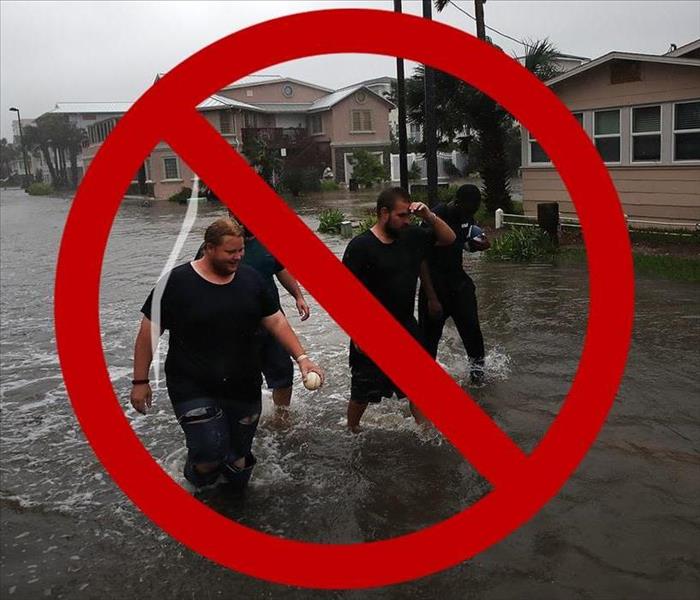 "Turn Around, Don't Drown!"
"Turn Around, Don't Drown!"
Flooding can come from all types of sources. Broken pipes, sprinkler systems, hurricanes and more. Floods are the most common, widespread disasters in the United States. Whether your home or business is near a coastline, along city streets, in the mountains, near a river or even out in the desert -there is always potential for flood damage. Just because you haven't experienced a flood in the past, does not mean you never will. 20% of flood insurance claims come from low-risk or no-risk areas. On average, floods cost $3.5 billion in annual losses in the United States.
According to the American Red Cross (ARC), floods cause more damage in the US every year than any other type of disaster.
-Stay away from flood waters. If the water is up above your ankles, "turn around, don't drown."
-If you approach a flooded road while driving, turn around and go the other way. If you get caught on a flooded road and water is rising quickly around you, get out of the car and go the higher ground as fast as you can.
-KEEP CHILDREN OUT OF THE WATER!
The Importance of Acting Quickly after a Disaster
10/9/2017 (Permalink)
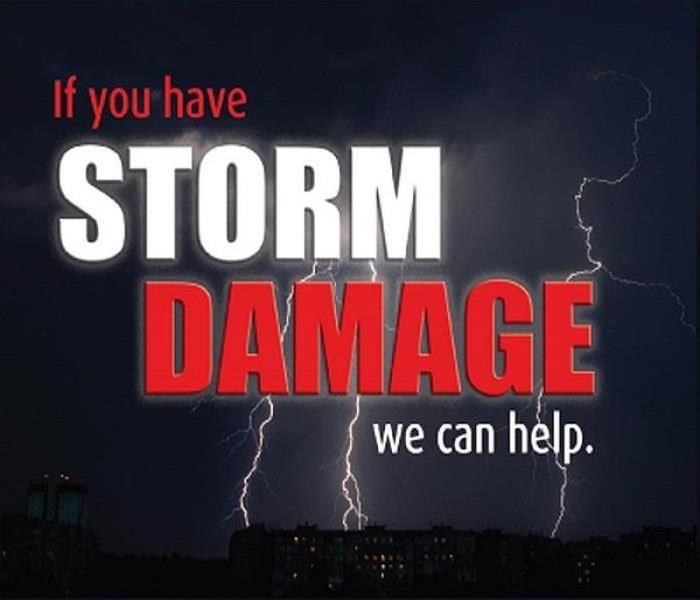 For over 35 years SERVPRO of Mandarin has provided Jacksonville with fast, dependable, quality service.
For over 35 years SERVPRO of Mandarin has provided Jacksonville with fast, dependable, quality service.
When a disaster strikes, it is imperative to respond quickly in order to prevent further damages and complications. Fires, mold infestations and floods from broken pipes, overflows or heavy storms – all such disasters must be dealt with in a timely manner. If not handled immediately you could experience on or more of these issues:
- If water-damaged structures and contents are not dried out quickly and correctly, potential health risks can develop. Mold can begin to grow within the first 24 to 48 hours after the flood.
- Excessive water can cause: rusting in metals, corrosion in electronic components, cracking, splitting or warping of furniture items, color bleeding or transfer in fabrics, furniture stains and secondary damage to upholstery, drapery, clothing, wallpaper, photos and papers.
- Fire or smoke damaged properties can also experience irreversible damage, regardless of the size of the fire. Soot residue is highly acidic and can pit or corrode the metal in doorknobs, plumbing fixtures, light fixtures, etc. It can also etch glass in windows, mirrors and cabinets, causing them to look soiled and cloudy. Moreover, plastics, appliances, fabrics and vinyl windows can become discolored.
- The safety and security of the home can be compromised. Windows and doors may become weak and function improperly, wet materials may collapse and electrical installations and components can be a health hazard when they come in contact with water. Slips and falls are also potential dangers.
If you’re not sure how to act after experiencing water, fire or mold problems in your home or business, contact SERVPRO of Mandarin at 904-636-0044. We have a team of restoration professionals ready 24/7/365 to help you.
Check out our Facebook, like us to get additional information and storm tips.
Why Should You Call a Professional Restoration Company for Water Damage?
10/9/2017 (Permalink)
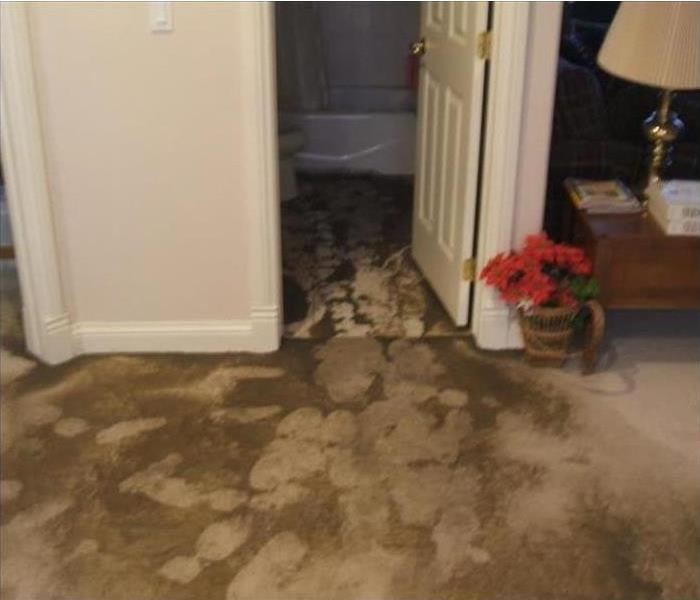 Home and Business Owners Are Not Equipped With the Necessary Tools and Expertise to Handle a Sewer Backup.
Home and Business Owners Are Not Equipped With the Necessary Tools and Expertise to Handle a Sewer Backup.
A water damage restoration service is the kind of professional that no one wants to call, but when they are needed it is important not to delay. Homeowners know that moisture is the enemy, capable of penetrating into just about any space, and taking advantage of every little crack and structural problem. No matter how moisture gets into a building, the response should be the same. Bring in a certified firm immediately to extract, dry and clean the structure to ensure that there are no lingering health threats once the moisture is gone.
If water has entered the structure through a contaminated source, do not try to handle it on your own. Floods and sewage backups contain multiple types of deadly bacteria, viruses and fungi, and even momentary skin contact can have serious effects on people causing serious illness. A certified water damage restoration service not only has the tools to eliminate the moisture, but they also have the necessary protective equipment to remain free from harm.
Restoration technicians have a lot of technology at their disposal. These include powerful truck mounted vacuums and pumping systems, high velocity air movers, dehumidifiers, heat injectors, moisture reading equipment, and a number of cleaning products formulated for destroying fungi and other microbial threats. White the technicians work on the structure, disposing of compromised materials, and drying the rest, they will also destroy all mold and microbial colonies. This is the only way to ensure a structure to be safe to live and work in. Any other cleaning method is a dangerous gamble.
The professional technicians with SERVPRO of Mandarin serve the Jacksonville area and have the latest IICRC certifications and the most up to date equipment and technology to help with any size water damage issue in any building located in northeast Florida. Call us today at 904-636-0044 for emergency water damage or estimate, to help clean and restore your structure from water related damage.
 SERVPRO of Jacksonville Beach/Ponte Vedra offers tips for hurricane preparedness to limit hurricane damage to your home.
SERVPRO of Jacksonville Beach/Ponte Vedra offers tips for hurricane preparedness to limit hurricane damage to your home.

 24/7 Emergency Service
24/7 Emergency Service
















